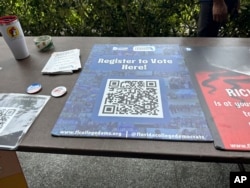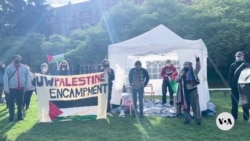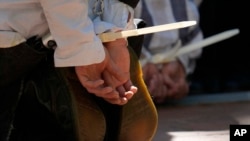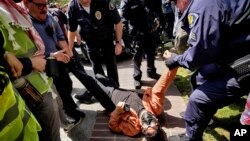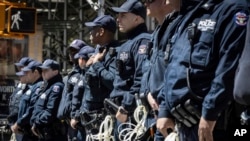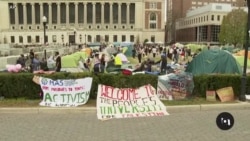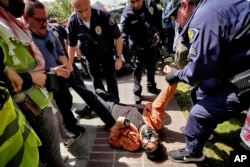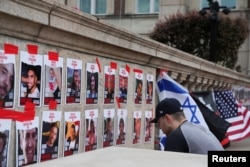Student Union
Florida Democrats hope abortion, marijuana issues draw young voters
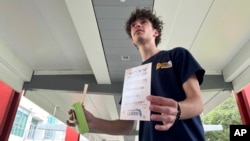
Jordan Vassallo is lukewarm about casting her first presidential ballot for President Joe Biden in November. But when the 18-year-old senior at Jupiter High School in Florida thinks about the things she cares about, she says her vote for the Democratic incumbent is an “obvious choice.”
Vassallo will be voting for a constitutional ballot amendment that would prevent the state of Florida from prohibiting abortion before a fetus can survive on its own — essentially the standard that existed nationally before the U.S. Supreme Court struck down the constitutional protections to abortion and left the matter for states to decide.
Passage of the amendment would wipe away Florida's six-week abortion law, which Vassallo says makes no sense.
“Most people don't know they are pregnant at six weeks,” she said.
Biden, despite her reticence, will get her vote as well.
In Florida and across the United States, voters in Vassallo's age group could prove pivotal in the 2024 election, from the presidency to ballot amendments and down-ballot races that will determine who controls Congress. She is likely to be among more than 8 million new voters eligible to vote this November since the 2022 elections, according to Tufts University Center for Information and Research on Civic Learning and Engagement.
While some of those voters share Vassallo's priorities of gun violence prevention and abortion rights, recent protests on college campuses about the war between Israel and Hamas, including at some Florida campuses, have thrown a new element of uncertainty into the mix. In Florida and elsewhere, observers across the political spectrum are looking on with intense interest.
Florida Democrats hope young voters will be driven to the polls by ballot amendments legalizing marijuana and enshrining abortion rights. They hope the more tolerant views of young voters on those issues will reverse an active voter registration edge of nearly 900,000 for Republicans in Florida, which has turned from the ultimate swing state in 2000 to reliably Republican in recent years.
According to AP VoteCast, an expansive survey of the electorate, about 8 in 10 Florida voters under age 45 in the 2022 midterm elections said the Supreme Court decision overturning Roe v. Wade had an impact on their decision to vote and who to support. The youngest voters, under age 30, appeared more likely than others to say the decision was the single most important factor in their votes, with about 3 in 10 saying that, compared with about 2 in 10 older voters.
Nathan Mitchell, president of Florida Atlantic University’s College Republicans, questions how impactful abortion will be in the election.
According to AP VoteCast, relatively few Florida voters in the 2022 midterms believed abortion should be either completely banned or fully permitted in all cases. Even among Republicans, just 12% said abortion should be illegal in all cases. About half of Republicans said it should be banned in most cases.
Voters under 45 were slightly more likely than others to say abortion should always be legal, with 30% taking that position.
Mitchell said while abortion is a strong issue, especially for women, he doesn't think it will drive many younger voters to the polls.
“I think other amendments will probably do that, especially the recreational marijuana amendment,” Mitchell said. “I think that’s going to bring out a lot more voters than abortion will.”
The AP VoteCast survey lends some credence to his thinking. About 6 in 10 Florida voters in the 2022 elections favored legalizing the recreational use of marijuana nationwide, the survey found. Among voters under 45, that was 76%. Still, it’s unclear how important that issue is for younger voters compared with other issues.
The big question is whether other issues can override Biden's enthusiasm problem among young Florida voters and elsewhere.
Six in 10 adults under 30 nationally said in a December AP-NORC Center for Public Affairs Research poll that they would be dissatisfied with Biden as the Democratic Party nominee in 2024. About 2 in 10 said in a March poll that “excited” would describe their emotions if Biden were reelected.
Young voters were crucial to the broad and racially diverse coalition that helped elect Biden in 2020. About 6 in 10 voters under 30 backed Biden nationally, according to AP VoteCas. A Pew Research Center survey showed that those under age 30 made up 38% of new or irregular voters in that election.
In Florida, Biden won 64% of young voters — similar to his national numbers.
New issues that concern young voters have emerged this year. Biden's handling of the Israel-Hamas war has sparked protests at college campuses across the country, and Biden's inability to deliver broad-based student loan forgiveness affects many young voters directly. Concern about climate change also continues to grow. AP-NORC data from February shows that majorities of Americans under 30 disapprove of how Biden is handling a range of issues, including the conflict between the Israelis and Palestinians, immigration, the economy, climate change and abortion policy.
But in Florida, it will be abortion rights and marijuana that give voters actual control over issues beyond a presidential rematch most did not want but got anyway, said Trevian Briskey, a 21-year-old FAU student.
Tony Figueroa, president of Miami Young Republicans, said the abortion issue is important to many young voters, regardless of where they stand. He noted, however, that Florida “is a very conservative state.” That means some of the young voters motivated by the issue favor stricter abortion laws.
“Given how Florida has become so much more red over the past couple of years, really it’s more of a way to galvanize or mobilize young voters where this is an important issue for them,” Figueroa said. “It’s really a way to get them to come out in droves.”
Matheus Xavier, 21, who studies biology at Florida Atlantic University, said he considered voting for Trump at some point, but changed his mind since Biden fell more in line with the things he cares about, including the preservation of abortion rights.
“At the end of the day, you got to go with what you support," he said. "I guess Biden kind of shows more of that. If there was another option that was actually good, I’d probably go for that.”
Pro-Palestinian encampment protesters hold ground on both US coasts
Campus protests of the war in Gaza continue, despite college administrations' warnings — and new ones are being launched. VOA Natasha Mozgovaya reports from an encampment set up Monday at the University of Washington in Seattle.
- By Reuters
Columbia suspends pro-Palestinian protesters after encampment talks stall
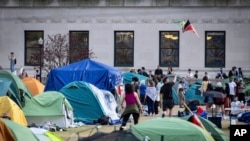
Columbia University on Monday began suspending pro-Palestinian activists who refused to dismantle a tent encampment on its New York City campus after the Ivy League school declared a stalemate in talks seeking to end the polarizing protest.
University President Nemat Minouche Shafik said in a statement that days of negotiations between student organizers and academic leaders had failed to persuade demonstrators to remove the dozens of tents set up to express opposition to Israel's war in Gaza.
The crackdown at Columbia, at the center of Gaza-related protests roiling university campuses across the U.S. in recent weeks, came as police at the University of Texas at Austin arrested dozens of students whom they doused with pepper spray at a pro-Palestinian rally.
Columbia sent a letter on Monday morning warning that students who did not vacate the encampment by 2 p.m. ET and sign a form promising to abide by university policies would face suspension and become ineligible to complete the semester in good standing.
"We have begun suspending students as part of this next phase of our efforts to ensure safety on our campus," said Ben Chang, a university spokesperson, at a briefing on Monday evening.
"The encampment has created an unwelcoming environment for many of our Jewish students and faculty and a noisy distraction that interferes with the teaching, learning and preparing for final exams," Chang said.
Earlier, Shafik said Columbia would not divest from finances in Israel, a key demand of the protesters. Instead, she offered to invest in health and education in Gaza and make Columbia's direct investment holdings more transparent.
Protesters have vowed to keep their encampment on the Manhattan campus until Columbia meets three demands: divestment, transparency in university finances, and amnesty for students and faculty disciplined for their part in the protests.
"These repulsive scare tactics mean nothing compared to the deaths of over 34,000 Palestinians. We will not move until Columbia meets our demands or we are moved by force," leaders of the Columbia Student Apartheid Divest coalition said in a statement read at a news conference following the deadline.
Hundreds of demonstrators, many wearing traditional Palestinian keffiyeh scarves, marched in circles around the exterior of the encampment chanting, "Disclose! Divest! We will not stop, we will not rest."
Shafik faced an outcry from many students, faculty and outside observers for summoning New York City police two weeks ago to dismantle the encampment.
After more than 100 arrests were made, students restored the encampment on a hedge-lined lawn of the university grounds within days of the April 18 police action.
Since then, students at dozens of campuses from California to New England have set up similar encampments to demonstrate their anger over the Israeli operation in Gaza and the perceived complicity of their schools in it.
The pro-Palestinian rallies have sparked intense campus debate over where school officials should draw the line between freedom of expression and hate speech
Students protesting Israel's military offensive in Gaza, including some Jewish peace activists, have said they are being censured as antisemitic merely for criticizing the Israeli government or for expressing support for Palestinian rights.
"The movement itself is not antisemitic," said Nicholas Fink, a freshman history major at Columbia who has not participated in the protests.
He is among a few dozen Jewish students who met privately with U.S. House of Representatives Speaker Mike Johnson during a campus visit by Republican members of Congress last week. Johnson and other congressional Republicans have claimed that Columbia and other universities have turned a blind eye to antisemitic hostility and harassment on campus.
Some Jewish groups argue that anti-Israel rhetoric frequently delves into or feeds overt forms of anti-Jewish hatred and calls for violence, and thus should not be tolerated
Student protests abound
At the University of California, Los Angeles, where opposing sides clashed over the weekend, pro-Israeli activists set up a large screen and loudspeakers to play a tape loop of the Oct. 7 attack on Israel by Hamas militants. The video appears aimed at countering pro-Hamas chants that seeped into campus protests in support of Palestinian civilians besieged in Gaza.
UCLA also stepped-up security around a pro-Palestinian encampment, consisting of more than 50 tents surrounded by metal fencing near the main administration building on campus.
Civil rights groups have criticized law enforcement tactics on some campuses, such as Atlanta's Emory University and the University of Texas at Austin, where police in riot gear and on horseback moved against protesters last week, taking dozens into custody before charges were dropped for lack of probable cause.
Protests, and arrests, flared anew on the Austin campus on Monday.
Campus police backed by Texas state troopers attempted to break up a large student protest using pepper spray and flash-bang charges, arresting at least 43 people, according to defense attorney George Lobb, who said he confirmed the number with court and jail staff processing the detentions.
Video posted on social media showed police pulling individual students from a gathering on a grassy area where demonstrators sat and locked arms, some of them shouting, "Let them go!" State troopers in riot gear stood guard behind the uniformed police.
Virginia Tech said on Monday that 91 protesters arrested on Sunday night at a student-led encampment had been charged with trespassing. Video posted on social media showed demonstrators chanting, "Shame on you" as some were taken into custody.
Xavier University of New Orleans moves closer to establishing a medical school
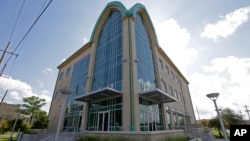
Xavier University, a small Catholic and historically Black school in New Orleans, formally signed an agreement Monday with Ochsner Health to establish a medical school.
When it opens, the Xavier Ochsner College of Medicine will join the nation’s four existing historically Black medical schools: Howard University College of Medicine, Morehouse School of Medicine, Meharry Medical College, and the Charles R. Drew University of Medicine and Science. Another historically Black institution, Maryland’s Morgan State University, also is setting up a medical school.
There's no firm opening date yet. It will likely take three years for the school to get accreditation from the Liaison Committee on Medical Education. Then it can start recruiting an initial class of 50.
Officials with the planned Xavier Oschner College of Medicine named the institution’s founding dean, Dr. Leonardo Seoane. He is currently the executive vice president and chief academic officer of Ochsner Health.
Plans for a medical school at Xavier were first announced in 2022. The agreement with Ochsner was formally announced in January of 2023. The Xavier University of Louisiana Board of Trustees and the Ochsner Health Board of Directors voted this past February to approve the formation of the new medical school.
The new medical school will be in an office tower next to the Superdome in an area designated as BioDistrict New Orleans, which is dedicated to economic development and jobs in the biological sciences.
Xavier was founded in 1925 and has developed a reputation for getting high numbers of African American students into medical schools.
“With the establishment of the Xavier Ochsner College of Medicine, Ochsner and Xavier aim to address long-standing health disparities and foster stronger, healthier communities in pursuit of the mission to promote a more just and humane society gifted to Xavier nearly 100 years ago by our foundress, St. Katharine Drexel and her Sisters of the Blessed Sacrament,” Xavier President Reynold Verret said in a statement.
New Orleans-based Ochsner Health has 46 hospitals and more than 370 health and urgent care centers in the Gulf South.
- By VOA News
Out-of-state and international students gather for Eid
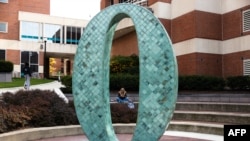
Many Muslim students at Ohio State were unable to return home for Eid al-Fitr, so they celebrated together instead.
Mariam Abaza reports for campus paper The Lantern. (April 2024)
Arrests roil campuses nationwide ahead of graduation
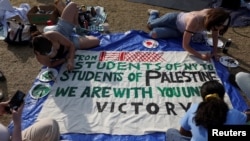
Protests are roiling college campuses nationwide as schools with graduation ceremonies next month face demands they cut financial ties to Israel because of the Israel-Hamas war.
Many campuses were largely quiet over the weekend but protesters on both sides of the issue shouted and shoved each other during dueling demonstrations Sunday at the University of California, Los Angeles.
About 275 people were arrested on Saturday at various campuses including Indiana University at Bloomington, Arizona State University and Washington University in St. Louis.
The number of arrests nationwide approached 900 since New York police removed a pro-Palestinian protest encampment at Columbia University and arrested more than 100 demonstrators on April 18.
Since then, students have dug in at dozens of pro-Palestinian encampments around the country, prompting a range of responses from administrators: arrests and criminal charges, student suspensions or simply continued pleas to leave.
The plight of students has become a central part of protests, with both the students and a growing number of faculty demanding amnesty for protesters. At issue is whether the suspensions and legal records will follow students through their adult lives.
Faculty members at universities in California, Georgia and Texas have initiated or passed largely symbolic votes of no confidence in their leadership.
White House national security spokesman John Kirby said President Joe Biden "knows that there are very strong feelings" but would leave managing the protests to local authorities.
"People should have the ability to air their views and to share their perspectives publicly but it has to be peaceful," Kirby said on ABC's "This Week."
In an interview that aired Sunday, Senate Republican Leader Mitch McConnell called it "a dangerous situation" and placed the responsibility with college administrators.
"There's also antisemitism, which is completely unacceptable. I've been shocked to see that in this country," he said on NBC's "Meet the Press."
How it started
Early protests at Columbia University in New York City sparked pro-Palestinian demonstrations across the country and students and administrators there have engaged in negotiations, the university said in a statement Saturday night.
Columbia has set a series of deadlines for protesters to leave the encampment — which they have missed — but bringing back police "at this time" would be counterproductive, the school wrote in an email to students.
On Sunday, students walked among dozens of colorful tents that continue to stand.
California
At the University of California, Los Angeles, police set up barricades before hundreds of demonstrators on both sides joined a growing crowd Sunday near where pro-Palestinian students have been staying around-the-clock in tents. Counter-protesters who organized a "Stand in Support of Jewish Students" rally said their goal was to "stand up against hatred and antisemitism."
Across town, the University of Southern California said it was open Sunday after being shut down a day earlier because of what the university called vandalism and disruptions.
USC drew criticism after refusing to allow the valedictorian, who has publicly supported the Palestinian cause, to make a commencement speech. Administrators then scrapped the keynote speech by filmmaker Jon M. Chu. Last week the school announced the cancelation of its main graduation event, a day after more than 90 protesters were arrested by police in riot gear.
In the northern part of the state, officials on Saturday ordered an "enforced hard closure" of California State Polytechnic University, Humboldt. Two halls remained occupied by pro-Palestinian demonstrators. The school said Sunday that the cost of the occupation — including damage done by "theft, vandalism and graffiti" — was estimated to be in the millions.
Missouri
Washington University in St. Louis locked some campus buildings and arrested protesters Saturday. Photos showed uniformed police attempting to remove masked protesters as others, also wearing masks, linked arms to thwart the efforts.
In a statement, the university said more than 100 people — including 23 students and four university employees — were arrested on suspicion of trespassing. Megan Green, president of the St. Louis Board of Aldermen, said in a social media post that she was present and the protest remained calm "until the police came in like an ambush."
Green Party presidential candidate Jill Stein said in a social media post that she and two of her campaign managers were among those arrested.
The university's statement defended the action and said protesters "did not have good intentions on our campus and that this demonstration had the potential to get out of control and become dangerous."
Some arrested also face charges of resisting arrest and assault, including for injuries to three police officers, the statement said. Those injuries include a severe concussion, a broken finger and a groin injury.
The Missouri chapter of the Council on American-Islamic Relations condemned the arrests as "heavy-handed."
Massachusetts
In Boston, police in riot gear cleared an encampment on the campus of Northeastern University on Saturday.
Massachusetts State Police said about 102 protesters were arrested and will be charged with trespassing and disorderly conduct.
Northeastern said in a statement that the demonstration, which began two days ago, had become "infiltrated by professional organizers" with no affiliation to the university and antisemitic slurs, including "kill the Jews," had been used.
The Huskies for a Free Palestine student group disputed the university's account, saying in a statement that counterprotesters were to blame for the slurs and no student protesters "repeated the disgusting hate speech."
Students at the Boston protest said a counterprotester attempted to instigate hate speech but insisted their event was peaceful.
U.S. campuses and the Israel-Hamas war
The nationwide campus protests began in response to Israel's offensive in Gaza. Hamas launched a deadly attack on southern Israel on Oct. 7, when militants killed about 1,200 people, most of them civilians, and took roughly 250 hostages. Vowing to stamp out Hamas, Israel launched an offensive in Gaza. In the ensuing war, Israel has killed more than 34,000 Palestinians in the Gaza Strip, according to the local health ministry.
Israel and its supporters have branded the university protests as antisemitic, while critics of Israel say it uses such allegations to silence opponents. Although some protesters have been caught on camera making antisemitic remarks or violent threats, organizers of the protests, some of whom are Jewish, say it is a peaceful movement aimed at defending Palestinian rights and protesting the war.
- By Jay Heisler
Rising unemployment hits Canada's international students hard
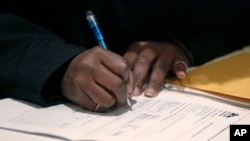
A tightening job market in Canada, fueled by a surge of immigration that produced the fastest population growth in 67 years, is hitting the country's large cohort of international students particularly hard.
With more than 1 million foreign students in the country who are largely restricted to low-wage, part-time jobs, photos are being shared on social media of long lines forming outside businesses with even a single job opening for a position such as cashier.
"The present affordability crisis in Vancouver, along with the declining job opportunities, is becoming very stressful," said Dhvani Malik, a fourth-year international relations student at the University of British Columbia.
"International students already pay so much in fees, and the increasing rent and living costs have only added to the financial pressure," Malik told VOA. "In my circle, students are taking multiple part-time jobs to address this burden. … Students have to make the bargain of getting certain groceries at some point and then leaving the rest for when they can afford it."
Youth unemployment hovers near 12%
Unemployment in Canada has been inching up in recent months, hitting 6.1% in March and roughly twice that for young people, according to the federal government's statistical agency. The trend is attributed in part to rapid population growth, fueled almost entirely by immigration and the arrival of temporary residents such as seasonal workers and foreign students.
In public remarks this month, Prime Minister Justin Trudeau effectively acknowledged that his government's strategy of addressing a severe labor shortage by opening the door to record numbers of immigrants and temporary residents has overshot the mark.
"To give an example, in 2017, 2% of Canada's population was made up of temporary immigrants," Trudeau was quoted by Global News as saying during a housing announcement in Dartmouth, Nova Scotia. "Now we're at 7.5% of our population comprised of temporary immigrants. That's something we need to get back under control."
Statistics Canada reported that the country's population of about 39 million grew last year at its fastest rate since 1957, with immigration accounting for almost all the growth. But while helping address a post-pandemic labor shortage, the rapid increase has placed pressure on housing costs and government-financed health care.
"We want to get those numbers down," Trudeau was quoted as saying in Nova Scotia. "It's a responsible approach to immigration that continues on our permanent residents, as we have, but also hold the line a little more on the temporary immigration that has caused so much pressure in our communities."
International students, who are offered pathways to employment in Canada and eventual citizenship after graduation, have been an important part of the rapid growth. Canada has roughly the same number of foreign students as the United States with eight times the population, The Washington Post reported this week.
Regulations restrict work hours
Because the foreign students pay much higher fees than Canadian citizens, they are also an important source of revenue for the nation's universities. However, facing mounting political pressure, the government in January announced new caps on the number of foreign students that would be admitted, and last month announced a plan to scale back the total number of temporary residents.
For foreign students seeking to support themselves in Canada while pursuing their degrees, the problem is exacerbated by regulations that restrict the kinds of jobs they can accept and the number of hours they can work.
"The main issue is that they cannot work full time," said Al Parsai, an immigration expert based in Toronto. "They also do not have a Canadian degree or Canadian work experience, yet. Consequently, they end up looking for hourly minimum wage jobs."
Malik, the UBC student, said she finds herself shut out of many job opportunities because she cannot provide a referral from a prior employer or relative in Canada.
"My field has several job opportunities in the nonprofit sector and the government, but those jobs are reserved for domestic students and refugees," she said.
"I have celiac disease, and the groceries are already so expensive that with the current crisis, it is becoming unaffordable to get through my grocery list," she said. "In a nutshell, the current crisis is making it difficult to stay in Canada."
The decision to cut back student visas, meanwhile, is expected to create financial headaches for universities such as UBC, one of the most prestigious in Canada, where tuition-paying international students accounted for 27% of the school's enrollment in 2022.
The harshest province to crack down on international students has so far been Ontario, which has aimed to give 96% of its foreign study permits only to public universities and colleges, shutting out private colleges that have been criticized as "diploma mills."
Quebec might go even further, as the Parti Quebecois has asked the provincial government to freeze all temporary immigration to Canada.
Student protesters seek amnesty to keep arrests, suspensions from trailing them
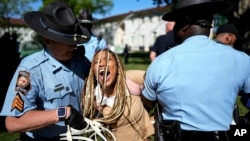
Maryam Alwan figured the worst was over after New York City police in riot gear arrested her and other protesters on the Columbia University campus, loaded them onto buses and held them in custody for hours.
But the next evening, the college junior received an email from the university. Alwan and other students were being suspended after their arrests at the " Gaza Solidarity Encampment," a tactic colleges across the country have deployed to calm growing campus protests against the Israel-Hamas war.
The students' plight has become a central part of protests, with students and a growing number of faculty demanding their amnesty. At issue is whether universities and law enforcement will clear the charges and withhold other consequences, or whether the suspensions and legal records will follow students into their adult lives.
Terms of the suspensions vary from campus to campus. At Columbia and its affiliated Barnard College for women, Alwan and dozens more were arrested April 18 and promptly barred from campus and classes, unable to attend in-person or virtually, and banned from dining halls.
Questions about their academic futures remain. Will they be allowed to take final exams? What about financial aid? Graduation? Columbia says outcomes will be decided at disciplinary hearings, but Alwan says she has not been given a date.
"This feels very dystopian," said Alwan, a comparative literature and society major.
What started at Columbia has turned into a nationwide showdown between students and administrators over anti-war protests and the limits of free speech. In the past 10 days, hundreds of students have been arrested, suspended, put on probation and, in rare cases, expelled from colleges including Yale University, the University of Southern California, Vanderbilt University and the University of Minnesota.
Barnard, a women's liberal arts college at Columbia, suspended more than 50 students who were arrested April 18 and evicted them from campus housing, according to interviews with students and reporting from the Columbia Daily Spectator campus newspaper, which obtained internal campus documents.
On Friday, Barnard announced it had reached agreements restoring campus access to "nearly all" of them. A statement from the college did not specify the number but said all students who had their suspensions lifted have agreed to follow college rules and, in some cases, were put on probation.
On the night of the arrests, however, Barnard student Maryam Iqbal posted a screenshot on the social media platform X of a dean's email telling her she could briefly return to her room with campus security before getting kicked out.
"You will have 15 minutes to gather what you might need," the email read.
More than 100 Barnard and Columbia faculty staged a "Rally to Support Our Students" last week condemning the student arrests and demanding suspensions be lifted.
Columbia is still pushing to remove the tent encampment on the campus main lawn where graduation is set to be hosted May 15. The students have demanded the school cuts ties with Israel-linked companies and ensure amnesty for students and faculty arrested or disciplined in connection with the protests.
Talks with the student protesters are continuing, said Ben Chang, a Columbia spokesperson. "We have our demands; they have theirs," he said.
For international students facing suspension, there is the added fear of losing their visas, said Radhika Sainath, an attorney with Palestine Legal, which helped a group of Columbia students file a federal civil rights complaint against the school Thursday. It accuses Columbia of not doing enough to address discrimination against Palestinian students.
"The level of punishment is not even just draconian, it feels like over-the-top callousness," Sainath said.
More than 40 students were arrested at a Yale demonstration last week, including senior Craig Birckhead-Morton. He is due to graduate May 20 but says the university has not yet told him if his case will be submitted to a disciplinary panel. He worries about whether he will receive a diploma and if his acceptance to Columbia graduate school could be at risk.
"The school has done its best to ignore us and not tell us what happens next," said Birckhead-Morton, a history major.
Across the country, college administrators have struggled to balance free speech and inclusivity. Some demonstrations have included hate speech, antisemitic threats or support for Hamas, the group that attacked Israel on October. 7, sparking a war in Gaza that the Hamas-controlled Gaza health ministry says has left more than 34,000 dead.
May commencement ceremonies add pressure to clear demonstrations. University officials say arrests and suspensions are a last resort, and that they give ample warnings beforehand to clear protest areas.
Vanderbilt University in Tennessee has issued what are believed to be the only student expulsions related to protesting the Israel-Hamas conflict, according to the Institute for Middle Eastern Understanding. More than two dozen students occupied the university chancellor's office for several hours on March 26, prompting the university to summon police and arrest several protesters. Vanderbilt then issued three expulsions, one suspension and put 22 protesters on probation.
In an open letter to Chancellor Daniel Diermeier, more than 150 Vanderbilt professors criticized the university's crackdown as "excessive and punitive."
Freshman Jack Petocz, 19, one of those expelled, is being allowed to attend classes while he appeals. He has been evicted from his dorm and is living off campus.
Petocz said protesting in high school was what helped get him into Vanderbilt and secure a merit scholarship for activists and organizers. His college essay was about organizing walkouts in rural Florida to oppose Gov. Ron DeSantis' anti-LGBTQ policies.
"Vanderbilt seemed to love that," Petocz said. "Unfortunately, the buck stops when you start advocating for Palestinian liberation."
War protesters at US universities dig in; some arrested as police clear encampments
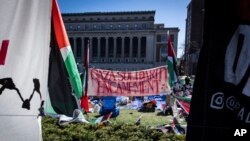
From New York to California, students protesting the Israel-Hamas war slept in tents at college campuses, as some universities moved to shut down encampments and arrested dozens of demonstrators after reports of antisemitic activity.
With the death toll mounting in the war in Gaza, protesters nationwide are demanding schools cut financial ties to Israel and divest from companies they say enable the conflict. Some Jewish students say the protests have veered into antisemitism and made them afraid to set foot on campus.
At Columbia University in New York City, where early protests sparked pro-Palestinian demonstrations across the country, students and administrators have engaged in negotiations, the university said in a statement Saturday night.
"Dialogue between university officials and student organizers is ongoing. We want to be clear: There is no truth to claims of an impending lockdown or evictions on campus," the Columbia administration's statement said.
Though the university repeatedly set and then pushed back deadlines for the removal of the encampment, the school sent an email to students saying that bringing back police "at this time" would be counterproductive.
Decisions to call in law enforcement, leading to hundreds of arrests nationwide, have prompted school faculty members at universities in California, Georgia and Texas to initiate or pass votes of no confidence in their leadership. They are largely symbolic rebukes, without the power to remove their presidents.
Washington University in St. Louis locked some campus buildings and arrested protesters Saturday. The St. Louis Police Department said in a social media post that it assisted campus police, although city officers did not make any arrests.
The Riverfront Times, a St. Louis weekly newspaper, reported more than 80 people were arrested during the protest that began in public areas before moving to the campus in the afternoon. Megan Green, president of the St. Louis Board of Aldermen, said in a social media post that she was present and the protest remained calm "until the police came in like an ambush."
Green Party Presidential Candidate Jill Stein said in a social media post that she and two of her campaign managers were among those arrested on the Washington University campus.
The University of Southern California said on Saturday it had temporarily closed its University Park Campus to nonresidents, without providing details of the closure or possible enforcement measures.
Joel Curran, senior vice president of communications, said in a statement that USC property was vandalized by members of a group "that has continued to illegally camp on our campus," as well as disrupting operations and harassing students and others.
Students declined numerous attempts by university President Carol Folt to meet, and the administration hopes for "a more reasonable response Sunday before we are forced to take further action," Curran said.
"While the university fully supports freedom of expression, these acts of vandalism and harassment are absolutely unacceptable and will not be tolerated," Curran said.
In Boston, police in riot gear cleared an encampment on the campus of Northeastern University on Saturday. Massachusetts State Police said about 102 protesters were arrested and will be charged with trespassing and disorderly conduct. Protesters said they were given about 15 minutes to disperse before being arrested.
As workers pulled down tents and bagged up the debris from the encampment, several dozen people across from the encampment chanted, "Let the kids go," and slogans against the war in Gaza. They also booed as police cars passed and taunted the officers who stood guard.
Northeastern said in a statement that the demonstration, which began two days ago, had become "infiltrated by professional organizers" with no affiliation to the university and antisemitic slurs, including "kill the Jews," had been used.
"We cannot tolerate this kind of hate on our campus," the statement posted on social media said.
The Huskies for a Free Palestine student group disputed the university's account, saying in a statement that counterprotesters were to blame for the slurs and no student protesters "repeated the disgusting hate speech."
Students at the Boston protest said a counterprotester attempted to instigate hate speech but insisted their event was peaceful and, like many across the country, was aimed at drawing attention to what they described as the "genocide" in Gaza and their university's complicity in the war.
The president of nearby Massachusetts Institute of Technology said in a statement Saturday that an encampment there had become a "potential magnet for disruptive outside protesters" and was taking hundreds of staff hours to keep safe.
"We have a responsibility to the entire MIT community — and it is not possible to safely sustain this level of effort," MIT President Sally Kornbluth said. "We are open to further discussion about the means of ending the encampment. But this particular form of expression needs to end soon."
Indiana University campus officers and state police arrested 23 people Saturday at an encampment on the school's Bloomington campus. Tents and canopies were erected Friday at Dunn Meadow in violation of school policy, university police said in a release. Group members were detained after refusing to remove the structures with charges ranging from criminal trespass to resisting law enforcement, police said.
Arizona State University said 69 people were arrested early Saturday on suspicion of criminal trespassing for setting up an unauthorized encampment on a lawn on its Tempe campus. The protesters were given chances to leave and those who refused were arrested.
"While the university will continue to be an environment that embraces freedom of speech, ASU's first priority is to create a safe and secure environment that supports teaching and learning," the university said in a statement.
The tensions have piled pressure on school officials, who are scrambling to resolve the protests as May graduation ceremonies near.
USC drew criticism after refusing to allow the valedictorian, who has publicly supported Palestinians, to make a commencement speech. Administrators then scrapped the keynote speech by filmmaker Jon M. Chu. The school on Thursday announced the cancellation of its main graduation event, a day after more than 90 protesters were arrested by police in riot gear.
Folt, the university president, made her first public statement late Friday, addressing the controversies as "incredibly difficult for all of us."
"No one wants to have people arrested on their campus. Ever. But, when long-standing safety policies are flagrantly violated, buildings vandalized, Department of Public Safety directives repeatedly ignored, threatening language shouted, people assaulted, and access to critical academic buildings blocked, we must act immediately to protect our community," Folt said.
The nationwide campus protests began in response to Israel's offensive in Gaza. Hamas launched a deadly attack on southern Israel on October 7, when militants killed about 1,200 people, most of them civilians, and took roughly 250 hostages. Vowing to stamp out Hamas, Israel launched an offensive in Gaza. In the ensuing war, Israel has killed more than 34,000 Palestinians in the Gaza Strip, according to the Hamas-controlled health ministry.
Israel and its supporters have branded the university protests as antisemitic, while critics of Israel say it uses such allegations to silence opponents. Although some protesters have been caught on camera making antisemitic remarks or violent threats, organizers of the protests, some of whom are Jewish, say it is a peaceful movement aimed at defending Palestinian rights and protesting the war.
- By VOA News
Here’s how Biden’s latest loan-forgiveness plan would work
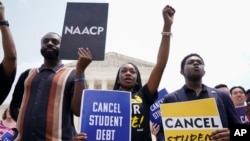
The plan could give as many as 30 million Americans a break, according to Andrew Restuccia and Oyin Adedoyin of The Wall Street Journal. (April 2024)
- By VOA News
What types of graduate student housing are there?
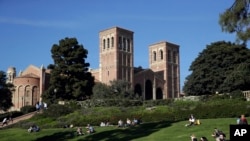
Anayat Durrani of the US News & World Report breaks down the options. (April 2024)
Pro-Palestinian protests spread on US university campuses
U.S. university campuses are seeing pro-Palestinian protests daily. Students are demonstrating against the Israel-Hamas war in Gaza and demanding that humanitarian aid be allowed to flow into the territory. VOA’s Veronica Balderas Iglesias reports.
US police clash with students who demand colleges cut financial ties to Israel
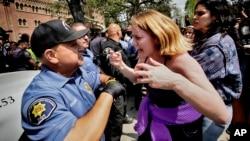
Police tangled with student demonstrators in the U.S. states of Texas and California while new encampments sprouted Wednesday at Harvard and other colleges as school leaders sought ways to defuse a growing wave of pro-Palestinian protests.
At the University of Texas at Austin, hundreds of local and state police — including some on horseback and holding batons — clashed with protesters, pushing them off the campus lawn and at one point sending some tumbling into the street. At least 20 demonstrators were taken into custody at the request of university officials and Texas Governor Greg Abbott, according to the state Department of Public Safety.
A photographer covering the demonstration for Fox 7 Austin was arrested after being caught in a push-and-pull between law enforcement and students, the station confirmed. A longtime Texas journalist was knocked down in the mayhem and could be seen bleeding before police helped him to emergency medical staff who bandaged his head.
At the University of Southern California, police got into a back-and-forth tugging match with protesters over tents, removing several before falling back. At the northern end of California, students were barricaded inside a building for a third day at California State Polytechnic University, Humboldt. The school shut down campus through the weekend and made classes virtual.
Harvard University in Massachusetts had sought to stay ahead of protests this week by limiting access to Harvard Yard and requiring permission for tents and tables. That didn't stop protesters from setting up a camp with 14 tents Wednesday following a rally against the university's suspension of the Harvard Undergraduate Palestine Solidarity Committee.
Students protesting the Israel-Hamas war are demanding schools cut financial ties to Israel and divest from companies enabling its monthslong conflict. Dozens have been arrested on charges of trespassing or disorderly conduct. Some Jewish students say the protests have veered into antisemitism and made them afraid to set foot on campus.
Columbia University averted another confrontation between students and police earlier in the day. The situation there remained tense, with campus officials saying it would continue talks with protesters for another 48 hours.
On a visit to campus, U.S. House Speaker Mike Johnson, a Republican, called on Columbia University President Minouche Shafik to resign "if she cannot bring order to this chaos."
"If this is not contained quickly and if these threats and intimidation are not stopped, there is an appropriate time for the National Guard," he said.
Shafik had set a midnight Tuesday deadline to reach an agreement on clearing an encampment, but the school extended negotiations, saying it was making "important progress."
On Wednesday evening, a Columbia spokesperson said rumors that the university had threatened to bring in the National Guard were unfounded. "Our focus is to restore order, and if we can get there through dialogue, we will," said Ben Chang, Columbia's vice president for communications.
Columbia graduate student Omer Lubaton Granot, who put up pictures of Israeli hostages near the encampment, said he wanted to remind people that there were more than 100 hostages still being held by Hamas.
"I see all the people behind me advocating for human rights," he said. "I don't think they have one word to say about the fact that people their age, that were kidnapped from their homes or from a music festival in Israel, are held by a terror organization."
Harvard law student Tala Alfoqaha, who is Palestinian, said she and other protesters want more transparency from the university.
"My hope is that the Harvard administration listens to what its students have been asking for all year, which is divestment, disclosure and dropping any sort of charges against students," she said.
Columbia encampment inspires others
Police first tried to clear the encampment at Columbia last week, when they arrested more than 100 protesters. The move backfired, acting as an inspiration for other students across the country to set up similar encampments and motivating protesters at Columbia to regroup.
On Wednesday about 60 tents remained at the Columbia encampment, which appeared calm. Security remained tight around campus, with identification required and police setting up metal barricades.
Columbia said it had agreed with protest representatives that only students would remain at the encampment and they would make it welcoming, banning discriminatory or harassing language.
On the University of Minnesota campus, a few dozen students rallied a day after nine protesters were arrested when police took down an encampment in front of the library. U.S. Representative Ilhan Omar, whose daughter was among the demonstrators arrested at Columbia last week, attended a protest later in the day.
A group of more than 80 professors and assistant professors signed a letter Wednesday calling on the university's president and other administrators to drop any charges and to allow future encampments without what they described as police retaliation.
They wrote that they were "horrified that the administration would permit such a clear violation of our students' rights to freely speak out against genocide and ongoing occupation of Palestine."
Netanyahu encourages police response
Israeli Prime Minister Benjamin Netanyahu lashed out at the pro-Palestinian demonstrations on U.S. college campuses in a video statement released Wednesday, saying the response of several university presidents has been "shameful" and calling on state, local and federal officials to intervene.
Students at some protests were hiding their identities and declined to identify themselves to reporters, saying they feared retribution. At an encampment of about 40 tents at the heart of the University of Michigan's campus in Ann Arbor, almost every student wore a mask, which was handed to them when they entered.
The upwelling of demonstrations has left universities struggling to balance campus safety with free speech rights. Many long tolerated the protests, but are now doling out more heavy-handed discipline, citing safety concerns.
At New York University this week, police said 133 protesters were taken into custody and all had been released with summonses to appear in court on disorderly conduct charges. More than 40 protesters were arrested Monday at an encampment at Yale University.
Columbia University demonstrators in talks with administration officials
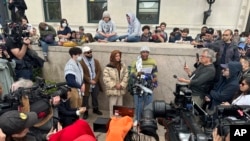
Officials at Columbia University were continuing talks Wednesday with student demonstrators from the Gaza Solidarity Encampment as the protest reaches a full week.
At 9:41 p.m. Tuesday, university President Nemat “Minouche” Shafik sent an email to the Columbia community setting a midnight deadline for an agreement to be reached about dismantling the encampment and dispersing the protesters.
“I very much hope these discussions are successful,” she wrote. “If they are not, we will have to consider alternative options for clearing the West Lawn and restoring calm to campus so that students can complete the term and graduate.”
As midnight passed, Columbia University Apartheid Divest posted a statement on X saying, “We refuse to concede to cowardly threats and blatant intimidation by university administration. We will continue to peacefully protest.”
The statement also said the university had threatened to call the National Guard. But after visiting the university earlier in the week, New York Governor Kathy Hochul said Tuesday she had no plans to deploy the National Guard.
As midnight approached on Tuesday, a student organizer announced that the deadline had been extended to 8 a.m. Wednesday.
At 4:09 a.m., the Office of the President sent an email saying the discussion deadline would be extended for 48 hours, given the constructive dialogue, and the university would report back on progress.
The email announced that leaders of the student encampment had agreed to remove a significant number of tents, get non-Columbia affiliates to leave the encampment and comply with New York Fire Department requirements. They also agreed to ensure that the encampment is “welcome to all” and to prohibit “discriminatory or harassing language.”
This development comes nearly a week after more than 100 students were arrested at the school on April 18, after Shafik authorized police to clear away protesters. Some of the students received suspension notices from the school.
Columbia’s action prompted an onslaught of pro-Palestinian demonstrations at other universities and responses from faculty and politicians.
Students at other campuses, such as Yale, Stanford and New York University, have also rallied around the Palestinian cause, calling for their universities to divest from companies with ties to Israel and for a cease-fire in Gaza. Many also have put up tent encampments on their campuses. About 150 students and faculty were arrested at New York University Monday night.
Columbia also announced Tuesday morning that classes on the Morningside main campus, where the protests are taking place, will be offered in a hybrid format for the remainder of the spring semester. The last day of classes is April 29.
- By VOA News
Paper: International students faced extra pandemic challenges
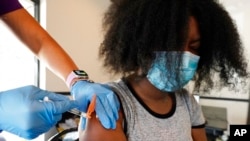
Astrobites, which describes itself as "a daily astrophysical literature journal written by graduate students in astronomy since 2010," focuses on the challenges international students faced during the COVID-19 pandemic.
It examines a paper published in the Journal of Comparative & International Higher Education entitled The Impact of the COVID-19 Pandemic on International Students in a Public University in the United States: Academic and Non-academic Challenges.
Read the Astrobites article here. (April 2024)




